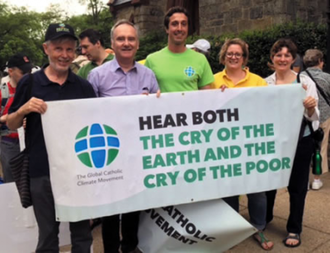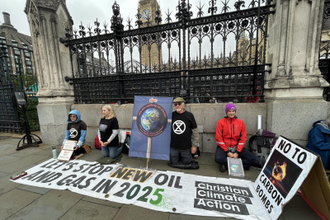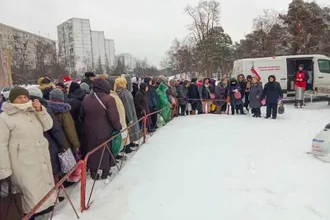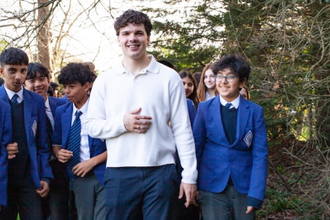30th Anniversary - 'What Is Happening to Our Beautiful Land?'

Scott Wright (left) with Catholic climate campaigners
Climate change is wreaking havoc on our world, and on our nation of the United States too. In the past eighteen months alone, we have witnessed devastating hurricanes on the Gulf Coast and Puerto Rico, even as Hurricane Florence bears down these days on the Atlantic Coast. There have been devastating droughts and wildfires in the West, destroying lands and forests and polluting the air: for a few days last month the pollution level in Seattle from these fires was even greater than that in Beijing. By expanding the production of oil, gas and coal, and promoting the construction of oil pipelines, the United States administration is making it easier to pollute the air with carbon emissions and to poison our rivers and underground waters with toxic chemicals. That was the message of the indigenous "water protectors" at Standing Rock in North Dakota in December 2016.
The "deep-seated crisis" we face today in the United States is not only the political crisis that captures the headlines in newspapers across the country, but the danger that we confront if we fail to respond boldly and urgently to the environmental crisis before us. The signs are not encouraging. In the past 18 months alone, the United States has pulled out of the Paris Agreement on Climate Change - the only country to do so - and is dismantling environmental programs and protections from the Clean Power Plan (proposed by the Obama administration in 2014), the Clean Water Plan (enacted by Congress in 1972), and the Environmental Protection Agency (founded in 1970), among others.
The 1988 document 'What is happening to our beautiful land?', produced in 1988 by the Bishops of the Philippines said:
We are now at a critical point in our history … The banner headlines absorb our attention so much so that we tend to overlook a more deep-seated crisis which, we believe, lies at the root of many of our economic and political problems. To put it simply: our country is in peril. All the living systems on land and in the seas around us are being ruthlessly exploited. The damage to date is extensive and, sad to say, it is often irreversible.
These words have a familiar ring to them. They could have been about any country in the world, and they could have been written today. Instead, they were written 30 years ago by the Catholic bishops of the Philippines, with encouragement and support from the Columbans, and they refer to the environmental crisis that country was and is facing. One of those most involved in the effort was Fr Sean McDonagh, who would play a similar role 26 years later in helping Pope Francis draft his encyclical letter on ecology, Laudato Si': On Care for Our Common Home.
The language the Philippine bishops used is powerful. They ask: "Who has benefited most and who has borne the real costs" of what they refer to as a "sinful assault on creation" by transnational corporations and extractive industries plundering their nation's resources and destroying the habitats of many poor and indigenous communities. They call on the faithful "to take a stand on the side of life," and "to defend the Earth," for it is a matter of life and death: "The poor are as disadvantaged as ever and the natural world has been grievously wounded."
The critical question they ask: "What is happening to our beautiful land?" is a question we can ask ourselves in the United States, and appreciate as a nation endowed with great beauty and abundance of natural resources. We have been blessed in many ways with a beautiful land, mountains and prairies, rivers and oceans, but are we taking care of them? Are we protecting them as a precious gift that we have been given, and which we will pass on to future generations? Or are we plundering with no thought to the devastating impact our actions have on local communities and the environment? Are we not accountable to present and future generations for the major way we contribute to climate change through an economy based on fossil fuel energy and carbon emissions?
Time to Celebrate the Season of Creation
Since 1 September, Columbans have joined millions of Catholics and Christians around the world in celebrating the Season of Creation, an annual celebration of prayer and action to protect and care for creation. The season, which runs until 4 October, the Feast of St. Francis of Assisi, celebrates the patron saint of ecology in many Christian traditions. The theme of this year's celebration has been "Walking Together." As brothers and sisters who share a common home on this planet, we are on a pilgrimage to better care for creation. The theme of "walking together" also reminds us of the 25 million "climate refugees" who have had to flee their homes this past year due to climate-related disasters.
The Season of Creation has ecumenical beginnings, but soon after Pope Francis appeared on the scene, he embraced it for Catholics as well. Every year on 1 September, Pope Francis writes a message for the occasion, and this year's message drew attention to water as a human right: "Our world owes a great social debt towards the poor who lack access to drinking water, because they are denied the right to a life consistent with their inalienable dignity" (LS 30). Water is essential to all life, and as such it is sacred and should not be bought and sold as a commodity at the expense of human life. Water is central to our faith, as we celebrate the waters of baptism and the living waters of our faith.
Yet in many parts of the world water is scarce, often due to the impact of climate change and severe droughts. What is available is increasingly hazardous to drink due to the toxic nature of nuclear energy and fossil fuel production, and the impact of extractive industries like mining and logging on sources of water. Contaminated water has serious health impacts on women and children, and water-borne diseases are a major cause of maternal and infant mortality in the world. Water sustains the environment and supports livelihoods, but when it is scarce or polluted, food production is disrupted and people migrate, which in turn generates conflict and violence, as in much of the Middle East and South Asia, and sometimes war, as in the case of both Syria and South Sudan.
Pope Francis is also concerned about the precious gift and value of all life, simply by virtue of being a part of God's creation. That is why the loss of biodiversity, some of it due to climate change, as well as to the negative impact of extractive industries like mining and logging on flora and fauna, is so grave: "Each year sees the disappearance of thousands of plant and animal species" (LS 33). In and of itself, each species that disappears is something to be mourned, an irretrievable loss of a precious gift of God's creation that has taken millions of years to evolve; but it will also have a devastating impact on human life. Already toxic pesticides are destroying the vital contribution of insects that pollinate our crops. Our future depends on the vital contribution of biodiversity for food and medicine: "The loss of forests and woodlands entails the loss of species which may constitute extremely important resources in the future" (LS 32).
What Is Happening in Our Common Home?
So it is good to ask ourselves on the 30th anniversary of the Filipino bishops' statement: "What is happening to our common home?" That is the question Pope Francis asks us to consider in his 2015 ground-breaking encyclical, Laudato Si': On Care for Our Common Home. This is not simply a reflection on the environment. We human beings are an integral part of creation; we are not separate from nature, nor is nature separate from us: "A true ecological approach always becomes a social approach," and deals with questions of justice and solidarity. For that reason, Pope Francis invites us "to hear both the cry of the earth and the cry of the poor" (LS 49). We have been given a sacred trust from God, the Gospel of Creation, and we are called to care for that creation, to defend and protect it just as we are called to care for, defend and protect the life of our neighbour, our immigrant sister or brother, or our own precious child, and to see in each of them, the face of Christ (Mt 25:31-46).
In Laudato Si, Pope Francis offers dramatic evidence about how climate change impacts the world, and especially the poor, in multiple ways. These include extreme weather events, devastating hurricanes, severe droughts and severe flooding, melting glaciers and rising sea levels. His conclusion, too, is clear: "A very solid scientific consensus indicates that we are presently witnessing a disturbing warming of the climatic system … due to the great concentration of greenhouse gases released mainly as a result of human activity" (LS 23). For that reason, we are called to "a global ecological conversion," (LS 5) and a reverence for "the inter-connectedness" of all creation.
Pope Francis is also concerned with global inequality. His urgent call for and profound hope in "ecological conversion" leads him to critique a global economy founded on profit and plunder and dependent on fossil fuels. He calls attention to the major responsibility that developed countries in the North bear for climate change and for over-consumption of the world's resources: what he calls the "social" (LS 30) and "ecological debt" (LS 51) owed by them to poor countries in the global South. One indication of this is that the wealthiest ten percent of the world's population is responsible for over half of the world's carbon emissions, while the poorest half of the world's population accounts for just ten percent of emissions (Oxfam 2015).
So, as we walk together on pilgrimage, let us keep in mind the one whom we commemorate on the final day of the Season of Creation, St. Francis. He is the "example par excellence of care for the vulnerable and of an integral ecology lived out joyfully and authentically" (LS 10). As we face the many challenges of our day, let us we offer thanks for the generous witness of those who protect and care for creation, especially indigenous peoples throughout the world, and take to heart these concluding words of Pope Francis: "May our struggles and our concern for this planet never take away the joy of our hope" (LS 244).
Scott Wright is Director of the Columban Center for Advocacy and Outreach in Washington, United States.


















